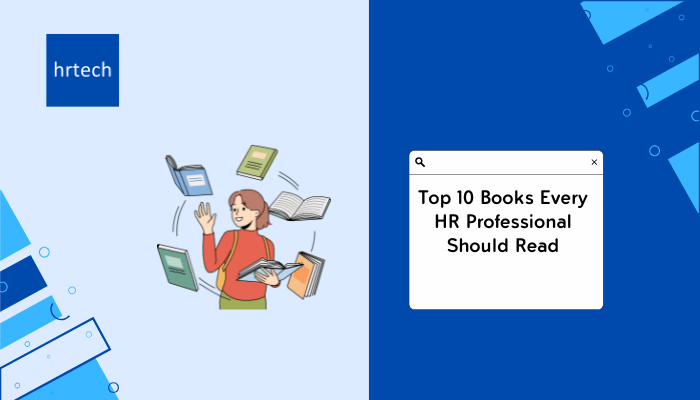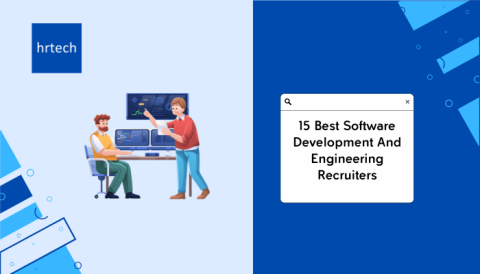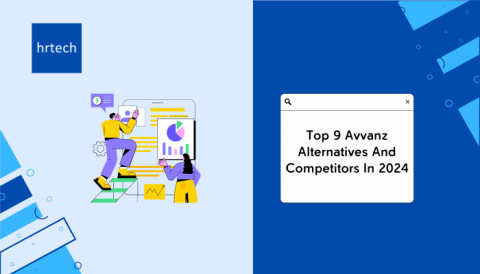The best HR books provide fresh perspectives and data-driven strategies, helping professionals navigate everything from talent retention to digital transformation. Competitive research highlights the popularity of specific titles that explore current issues such as diversity and inclusion, the impact of AI on recruitment, and employee engagement strategies.
For HR professionals, staying informed and adaptable is vital to thriving in today’s rapidly changing workplace. Reading can be one of the most effective ways to broaden your knowledge, and the right resources offer transformative strategies that can sharpen your approach to people management, workplace culture, and employee engagement. Here, we’ve curated a list of great HR books, each one providing invaluable insights and proven strategies to help you navigate HR challenges. Whether you’re a new recruit or a seasoned veteran, these reads can equip you with actionable solutions and fresh perspectives.
Books like Lucy Adams’ HR Disrupted and Jack Altman’s People Strategy have become essential resources, praised for their practical approaches and real-world insights. Whether you’re looking to modernize people management practices or drive organizational growth, these 10 great HR books offer essential guidance, equipping professionals with actionable insights to tackle today’s biggest HR challenges effectively.
10 Must-Read Books for HR Professionals
For HR professionals looking to stay informed and innovative, investing time in reading the right resources can make a substantial difference. This curated list of 10 must-read books provides actionable insights, proven strategies, and inspiring case studies to tackle modern workplace challenges effectively. These books cover everything from fostering an inclusive culture and retaining top talent to adapting HR practices for hybrid work environments, providing a balanced mix of both foundational HR principles and forward-thinking ideas.
Backed by facts and figures, such as the finding from Deloitte that 79% of executives view employee experience as central to organizational success, these books serve as powerful tools to build impactful, employee-centric practices. Each of these reads has earned its spot as one of the great HR books, offering essential knowledge that can help HR professionals lead with confidence and precision in today’s dynamic work landscape.
1. HR Disrupted: It’s Time for Something Different by Lucy Adams

Lucy Adams dives into why traditional HR practices no longer serve modern organizations. In HR Disrupted Adams confronts outdated norms and proposes a shift towards a more agile, employee-centered approach, providing readers with practical solutions to modernize their HR functions.
Key Insights:
1. Evolving HR Practices: Adams highlights the need to transform HR practices to align with today’s workplace demands. Traditional methods can often feel rigid, and Adams encourages adopting more flexible and adaptive processes to improve overall efficiency.
2. Addressing Modern HR Challenges: With practical solutions for modern challenges, this book is particularly relevant in today’s workplace where flexible work arrangements and changing employee expectations are paramount.
3. Insight from Experience: Leveraging her extensive experience, Adams provides insights that challenge HR professionals to think outside the box. This is one of those great HR books that pushes for a meaningful shift in how HR views its role.
Why It’s Essential: Adams’s bold approach makes this one of the best HR books for professionals looking to question the status quo and implement real, lasting change.
2. Speak-Up Culture: When Leaders Truly Listen, People Step Up by Stephen Shedletzky

In Speak-Up Culture Stephen Shedletzky explores how organizations can benefit from encouraging open dialogue. Shedletzky examines how empowering employees to speak up can foster an environment of accountability, innovation, and trust.
Key Insights:
1. The Power of a Speak-Up Culture: Shedletzky makes a compelling case for the impact of open communication on overall organizational health. When employees feel safe to voice concerns or share ideas, it boosts morale and productivity.
2. Listening as a Leadership Skill: One of the most transformative parts of Speak-Up Culture is its emphasis on the value of listening. Leaders who genuinely listen can create a supportive environment where employees feel respected and valued.
3. Practical Guidance for Open Dialogue: Shedletzky doesn’t just highlight the importance of a speak-up culture; he provides step-by-step advice on fostering open dialogue within your organization. This makes it a great HR book for professionals focused on cultivating trust and collaboration.
Why It’s Essential: Speak-Up Culture is among the great HR books for understanding the dynamics of employee voice, making it invaluable for HR teams aiming to strengthen engagement.
3. Employalty: How to Ignite Commitment and Keep Top Talent in the New Age of Work by Joe Mull

Retaining top talent has become a major challenge for organizations, and Joe Mull tackles this issue with the concept of “Employalty.” Combining “employment” and “loyalty,” Mull’s book introduces a framework designed to build long-term commitment among employees.
Key Insights:
1. Employalty Defined: Mull introduces “Employalty” as a way to merge the professional aspirations of employees with the goals of the organization. This approach taps into the desire for meaningful work, making it a cornerstone for great HR practices.
2. Talent Attraction and Retention: Mull offers actionable strategies for attracting and retaining talent. By understanding what motivates employees, HR professionals can create an environment that supports both career and personal growth.
3. Transforming Workplace Culture: Mull’s framework is particularly helpful for HR teams focused on building loyalty and commitment. The book’s strategies emphasize cultural transformation, making it one of the great HR books for enhancing organizational stability.
Why It’s Essential: Employalty stands out among great HR books for its actionable advice on building a loyal and motivated workforce, providing a roadmap for HR professionals to develop talent retention strategies.
4. Redefining HR: Transforming People Teams to Drive Business Performance by Lars Schmidt

Lars Schmidt’s Redefining HR is a game-changer for HR professionals looking to play a more strategic role. The book is packed with case studies and actionable advice on how HR can support and drive business performance.
Key Insights:
1. Modernizing HR: Schmidt focuses on the need to modernize HR departments, covering aspects like people analytics, diversity, and inclusion. By integrating these elements, HR can become a critical player in business performance.
2. Diversity, Inclusion, and People Analytics: Through real-life case studies, Schmidt demonstrates how diversity and people analytics can influence organizational success. The book offers a guide for incorporating these strategies to enhance workplace culture and outcomes.
3. Actionable Strategies: Schmidt’s advice is highly practical, making Redefining HR one of the great HR books for HR professionals looking to implement change and drive performance within their teams.
Why It’s Essential: This book is perfect for HR leaders seeking to build a forward-thinking people strategy and align HR with business goals.
5. People Strategy: How to Invest in People and Make Culture Your Competitive Advantage by Jack Altman

Jack Altman’s People Strategy is all about the value of investing in people. Altman’s book provides a framework for building a strong, people-centered culture that ultimately drives business success.
Key Insights:
1. Using Culture as a Competitive Advantage: Altman emphasizes that a positive workplace culture can be a major competitive edge. This book offers actionable advice on how to leverage culture to attract and retain talent.
2. Tracking Engagement and Performance: Altman shares practical methods for tracking team engagement and performance, making it easier for HR leaders to measure cultural impact.
3. Creating a People-Centric Vision: With a people-first approach, People Strategy is one of the great HR books for professionals who believe that business success starts with employee well-being.
Why It’s Essential: Altman’s book is an invaluable guide for HR professionals wanting to foster a people-centered culture that supports business objectives.
6. HR for Hybrid Working: How to Adapt People Practices to Support Employees and the Organization by Gary Cookson

Gary Cookson’s HR for Hybrid Working is a timely guide for navigating the new challenges of a hybrid work environment. This book offers a clear roadmap for HR professionals to adapt to the unique needs of hybrid teams.
Key Insights:
1. Strategies for Hybrid Work: Cookson provides specific strategies for managing a hybrid workforce, such as setting clear communication channels and ensuring equal opportunities for all employees.
2. Policy Adaptation: This book emphasizes the need to rethink policies around performance, mental health, and work-life balance to cater to both in-office and remote employees.
3. Technological and Skills Adaptation: For those in HR who are looking to adapt to the digital demands of hybrid work, this is one of the great HR books with advice on tech solutions and essential skills.
Why It’s Essential: HR for Hybrid Working is one of the best HR books for helping professionals effectively manage and support hybrid teams, a trend that’s here to stay.
7. Rituals for Work: 50 Ways to Create Engagement, Shared Purpose, and a Culture That Can Adapt to Change by Kursat Ozenc and Margaret Hagan

In Rituals for Work Kursat Ozenc and Margaret Hagan introduce the concept of rituals as a tool for boosting engagement and fostering a strong, adaptable culture. This book offers a collection of creative and meaningful rituals that can make a tangible impact on workplace culture.
Key Insights:
1. Role of Rituals in Engagement: Ozenc and Hagan show how rituals can increase employee engagement and reinforce a sense of shared purpose. These rituals serve as touchstones, bringing people together and strengthening team dynamics.
2. Case Studies and Ritual Ideas: The book features a variety of case studies and ritual ideas that can be adapted to any workplace, making it an incredibly versatile resource.
3. Supporting Shared Values and Adaptability: Rituals can reinforce shared values and make it easier for teams to adapt to change, especially in fast-paced or transitional periods.
Why It’s Essential: Rituals for Work is one of the great HR books for fostering a resilient and unified company culture that adapts to changes effectively.
8. The Essential HR Handbook, 10th Anniversary Edition: A Quick and Handy Resource for Any Manager or HR Professional by Sharon Armstrong and Barbara Mitchell

For a comprehensive overview of HR basics, The Essential HR Handbook is an invaluable resource. Armstrong and Mitchell cover everything an HR professional needs to know, from recruitment to compliance, in a quick-reference format.
Key Insights:
1. Comprehensive HR Guide: The book provides a well-rounded look at HR, covering topics that are relevant to both new and experienced professionals, including legal considerations, performance management, and employee relations.
2. Quick-Reference Format: With easy-to-navigate sections, The Essential HR Handbook is ideal for busy professionals who need fast answers.
3. Updated Content for Modern Challenges: The 10th-anniversary edition includes updates for recent HR trends, making it a relevant resource for today’s workplace
.Why It’s Essential: This handbook is one of the great HR books for HR professionals who need a solid foundation across all areas of human resources.
9. HR from the Outside In: Six Competencies for the Future of Human Resources by Dave Ulrich, Jon Younger, Wayne Brockbank, and Mike Ulrich

Dave Ulrich and his team lay out six key competencies that can help HR professionals become strategic leaders. HR from the Outside In offers a roadmap for positioning HR as a driver of organizational success.
Key Insights:
1. Competencies for the Future: The authors outline competencies that are critical for HR’s future, such as business acumen, change management, and stakeholder relationship management.
2. HR as Strategic Partner: Ulrich emphasizes the importance of aligning HR with business strategy, helping HR leaders understand their role in achieving organizational goals.
3. Clear Framework for Success: Each competency is detailed with practical steps, making this book a valuable roadmap for strategic growth in HR.
Why It’s Essential: This book stands out among great HR books for its future-focused competencies, helping HR professionals elevate their impact.
10. HR Rising!! From Ownership to Leadership by Steve Browne

Steve Browne’s HR Rising!! is a motivational guide for HR professionals ready to step into leadership. Browne covers topics ranging from employee engagement to cultivating a personal leadership style.
Key Insights:
1. Shift from Ownership to Leadership: Browne challenges HR professionals to take ownership of their role and evolve into influential leaders.
2. Employee Engagement and Development: The book emphasizes the importance of employee engagement, offering tips for motivating and developing your workforce.
3. Inspiring Leadership: Browne’s insights encourage HR professionals to focus on personal growth, making it one of the best HR books for those ready to step into a leadership mindset.
Why It’s Essential: HR Rising!! is a great HR book for anyone in the field of HR looking to grow into a leadership role, offering practical advice and motivational insights.
Conclusion
These great HR books offer a wealth of knowledge for HR professionals aiming to elevate their skills and make a meaningful impact. Each book provides distinct insights from fostering open dialogue and designing effective rituals to modernizing HR practices for the hybrid workplace.
By diving into these resources, HR professionals can find practical solutions and strategies to navigate modern challenges, foster workplace culture, and drive organizational success.
Reading and applying the insights from these great HR books is an investment that benefits not only HR teams but the entire organization. Ready to take your HR expertise to the next level?
Contact us to learn more about how the right hrtech tools can complement the strategies in these must-read books and transform your approach to HR!





